The Cambridge History of Japan, Vol. 4: Early Modern Japan
Подождите немного. Документ загружается.

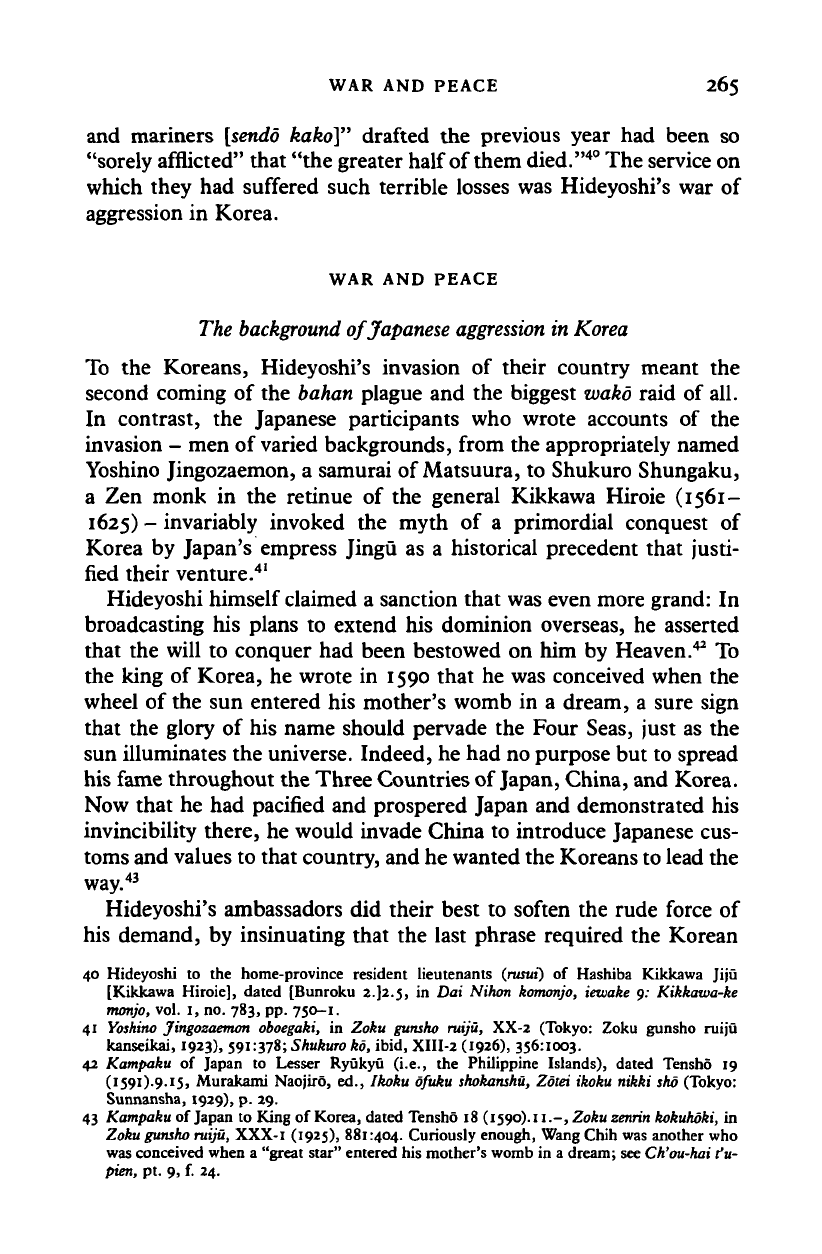
WAR AND PEACE 265
and mariners
[sendo
kako]" drafted the previous year had been so
"sorely afflicted" that "the greater half of them died."
40
The service on
which they had suffered such terrible losses was Hideyoshi's war of
aggression in Korea.
WAR AND PEACE
The background of Japanese
aggression
in Korea
To the Koreans, Hideyoshi's invasion of their country meant the
second coming of the
bahan
plague and the biggest wako raid of all.
In contrast, the Japanese participants who wrote accounts of the
invasion - men of varied backgrounds, from the appropriately named
Yoshino Jingozaemon, a samurai of Matsuura, to Shukuro Shungaku,
a Zen monk in the retinue of the general Kikkawa Hiroie
(1561-
1625) - invariably invoked the myth of a primordial conquest of
Korea by Japan's empress Jingu as a historical precedent that justi-
fied their venture.
4
'
Hideyoshi himself claimed a sanction that was even more grand: In
broadcasting his plans to extend his dominion overseas, he asserted
that the will to conquer had been bestowed on him by Heaven.
42
To
the king of Korea, he wrote in 1590 that he was conceived when the
wheel of the sun entered his mother's womb in a dream, a sure sign
that the glory of his name should pervade the Four Seas, just as the
sun illuminates the universe. Indeed, he had no purpose but to spread
his fame throughout the Three Countries of Japan, China, and Korea.
Now that he had pacified and prospered Japan and demonstrated his
invincibility there, he would invade China to introduce Japanese cus-
toms and values to that country, and he wanted the Koreans to lead the
way.
43
Hideyoshi's ambassadors did their best to soften the rude force of
his demand, by insinuating that the last phrase required the Korean
40 Hideyoshi to the home-province resident lieutenants (rusui) of Hashiba Kikkawa Jiju
[Kikkawa Hiroie], dated [Bunroku 2O2.5, in Dai Nihon komonjo, ieiaake 9: Kikkawa-ke
monjo, vol. I, no. 783, pp.
750-1.
41
Yoshino
Jingozaemon oboegaki, in Zoku gunsho ruiju, XX-2 (Tokyo: Zoku gunsho ruiju
kanseikai, 1923), 591:378;
Shukuro
kd, ibid, XIII-2 (1926), 356:1003.
42 Kampaku of Japan to Lesser Ryukyu (i.e., the Philippine Islands), dated Tensho 19
(1591)9.15, Murakami Naojiro, ed., Ikoku ofuku
shokanshu,
Zotei ikoku nikki sho (Tokyo:
Sunnansha, 1929), p. 29.
43 Kampaku of Japan to King of Korea, dated Tensho 18 (1590). 11.-, Zoku
zenrin
kokuhoki,
in
Zoku
gunsho
ruiju, XXX-i (1925), 881:404. Curiously enough, Wang Chih was another who
was conceived when a "great star" entered his mother's womb in a dream; see Ch'ou-hai fu-
pien,
pt. 9, f. 24.
Cambridge Histories Online © Cambridge University Press, 2008
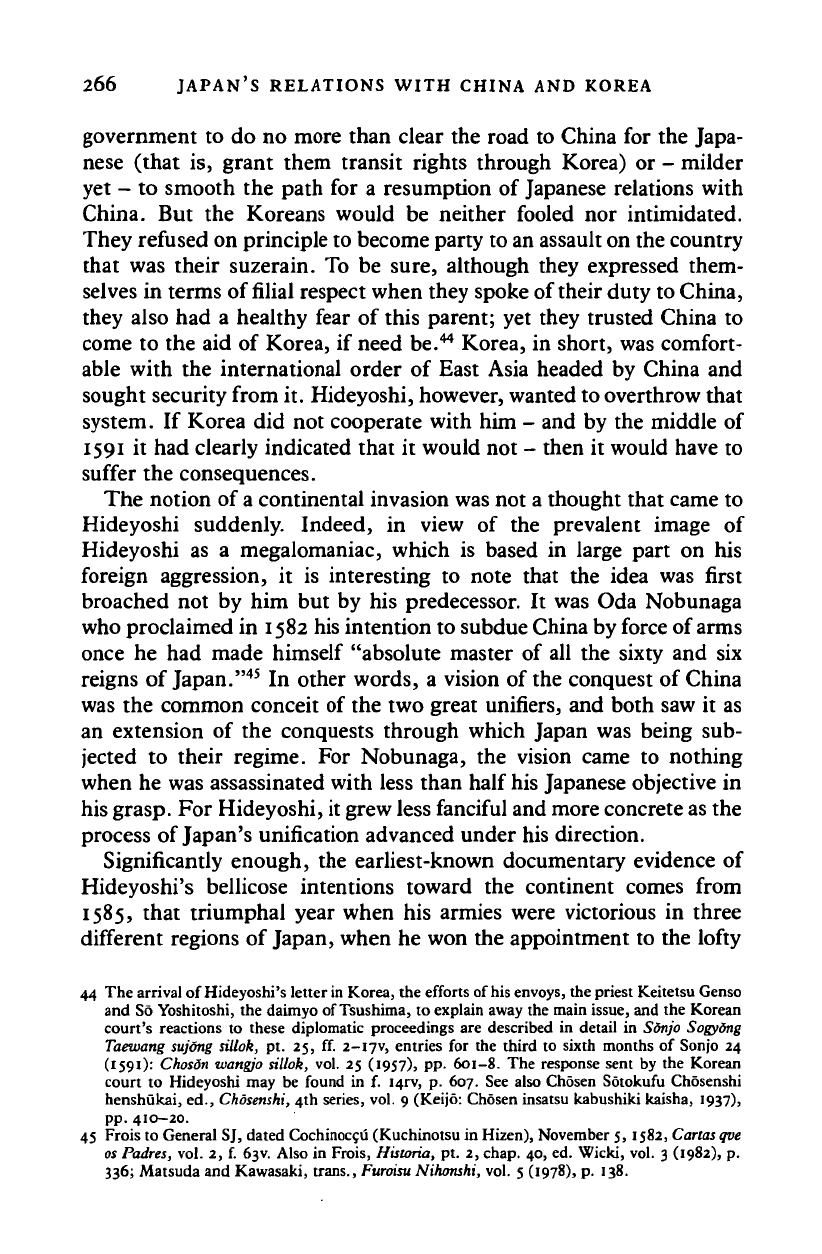
266 JAPAN'S RELATIONS WITH CHINA AND KOREA
government to do no more than clear the road to China for the Japa-
nese (that is, grant them transit rights through Korea) or - milder
yet - to smooth the path for a resumption of Japanese relations with
China. But the Koreans would be neither fooled nor intimidated.
They refused on principle to become party to an assault on the country
that was their suzerain. To be sure, although they expressed them-
selves in terms of filial respect when they spoke of their duty to China,
they also had a healthy fear of this parent; yet they trusted China to
come to the aid of Korea, if need be.
44
Korea, in short, was comfort-
able with the international order of East Asia headed by China and
sought security from it. Hideyoshi, however, wanted to overthrow that
system. If Korea did not cooperate with him - and by the middle of
1591 it had clearly indicated that it would not - then it would have to
suffer the consequences.
The notion of
a
continental invasion was not a thought that came to
Hideyoshi suddenly. Indeed, in view of the prevalent image of
Hideyoshi as a megalomaniac, which is based in large part on his
foreign aggression, it is interesting to note that the idea was first
broached not by him but by his predecessor. It was Oda Nobunaga
who proclaimed in 1582 his intention to subdue China by force of arms
once he had made himself "absolute master of all the sixty and six
reigns of Japan."
45
In other words, a vision of the conquest of China
was the common conceit of the two great unifiers, and both saw it as
an extension of the conquests through which Japan was being sub-
jected to their regime. For Nobunaga, the vision came to nothing
when he was assassinated with less than half
his
Japanese objective in
his grasp. For Hideyoshi, it grew less fanciful and more concrete as the
process of Japan's unification advanced under his direction.
Significantly enough, the earliest-known documentary evidence of
Hideyoshi's bellicose intentions toward the continent comes from
1585,
that triumphal year when his armies were victorious in three
different regions of Japan, when he won the appointment to the lofty
44 The arrival of Hideyoshi's letter in Korea, the efforts of his envoys, the priest Keitetsu Genso
and So Yoshitoshi, the daimyo of Tsushima, to explain away the main issue, and the Korean
court's reactions to these diplomatic proceedings are described in detail in Sdnjo
SogyOng
Taewang sujong sillok, pt. 25, ff. 2-17V, entries for the third to sixth months of Sonjo 24
(1591):
Chosdn wangjo sillok, vol. 25 (1957), pp. 601-8. The response sent by the Korean
court to Hideyoshi may be found in f. 141% p. 607. See also Chosen Sotokufu Chosenshi
henshukai, ed., Chosenshi, 4th series, vol. 9 (Keijo: Chosen insatsu kabushiki kaisha, 1937),
pp.
410—20.
45 Frois to General SJ, dated Cochinoccu (Kuchinotsu in Hizen), November 5, 1582, Cartas qve
os Padres, vol. 2, f. 63V. Also in Frois, Historia, pt. 2, chap. 40, ed. Wicki, vol. 3 (1982), p.
336;
Matsuda and Kawasaki, trans.,
Furoisu
Nihonshi, vol. 5 (1978), p. 138.
Cambridge Histories Online © Cambridge University Press, 2008
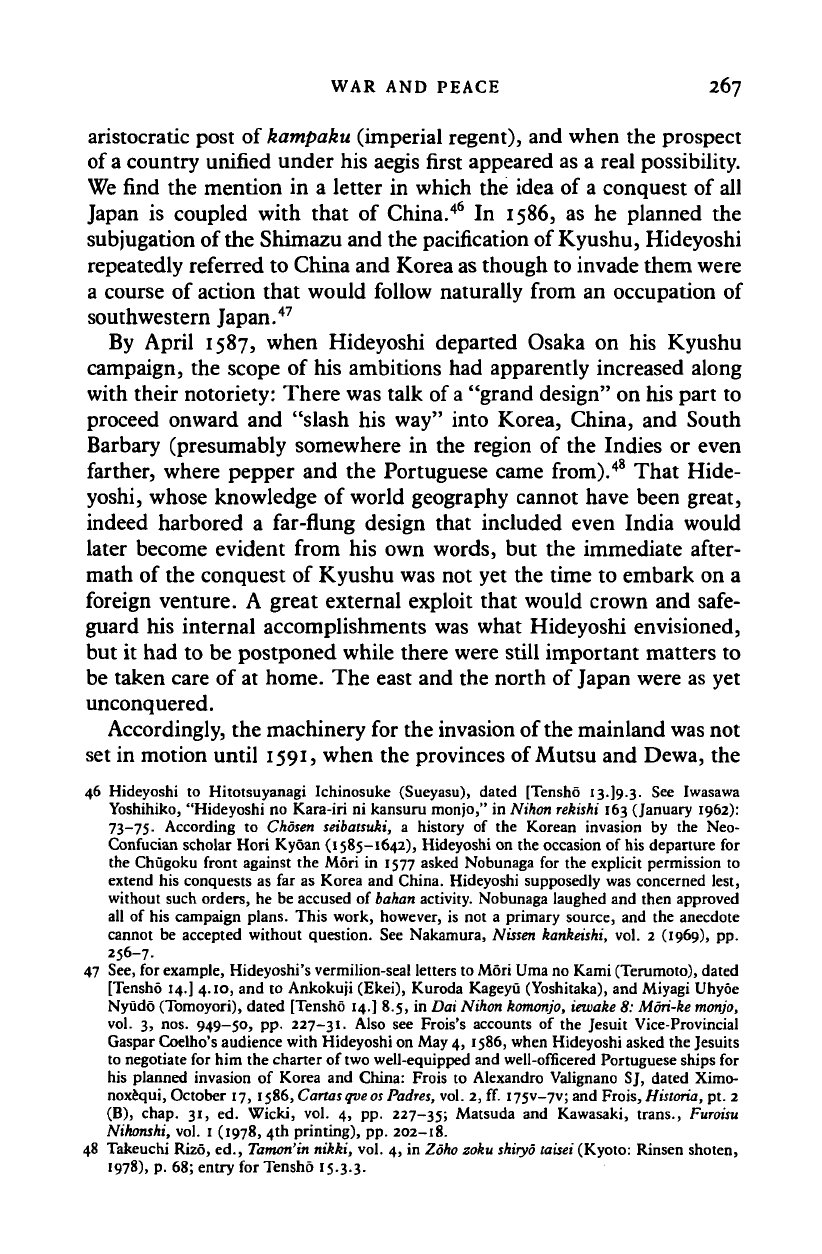
WAR AND PEACE 267
aristocratic post of kampaku (imperial regent), and when the prospect
of a country unified under his aegis first appeared as a real possibility.
We find the mention in a letter in which the idea of a conquest of all
Japan is coupled with that of China.
46
In 1586, as he planned the
subjugation of the Shimazu and the pacification of Kyushu, Hideyoshi
repeatedly referred to China and Korea as though to invade them were
a course of action that would follow naturally from an occupation of
southwestern Japan.
47
By April 1587, when Hideyoshi departed Osaka on his Kyushu
campaign, the scope of his ambitions had apparently increased along
with their notoriety: There was talk of
a
"grand design" on his part to
proceed onward and "slash his way" into Korea, China, and South
Barbary (presumably somewhere in the region of the Indies or even
farther, where pepper and the Portuguese came from).
48
That Hide-
yoshi, whose knowledge of world geography cannot have been great,
indeed harbored a far-flung design that included even India would
later become evident from his own words, but the immediate after-
math of the conquest of Kyushu was not yet the time to embark on a
foreign venture. A great external exploit that would crown and safe-
guard his internal accomplishments was what Hideyoshi envisioned,
but it had to be postponed while there were still important matters to
be taken care of at home. The east and the north of Japan were as yet
unconquered.
Accordingly, the machinery for the invasion of the mainland was not
set in motion until 1591, when the provinces of Mutsu and Dewa, the
46 Hideyoshi
to
Hitotsuyanagi Ichinosuke (Sueyasu), dated [Tensho 13.19.3.
See
Iwasawa
Yoshihiko, "Hideyoshi
no
Kara-iri
ni
kansuru monjo,"
in
Nihon rekishi
163
(January 1962):
73-75-
According
to
Chosen seibatsuki,
a
history
of the
Korean invasion
by the Neo-
Confucian scholar Hori Kyoan (1585-1642), Hideyoshi
on the
occasion
of
his departure
for
the Chugoku front against
the
Mori
in 1577
asked Nobunaga
for the
explicit permission
to
extend
his
conquests
as far as
Korea
and
China. Hideyoshi supposedly
was
concerned lest,
without such orders,
he be
accused
of
bahan
activity. Nobunaga laughed
and
then approved
all
of his
campaign plans. This work, however,
is not a
primary source,
and the
anecdote
cannot
be
accepted without question.
See
Nakamura, Nissen kankeishi,
vol. 2
(1969),
pp.
256-7.
47
See, for
example, Hideyoshi's vermilion-seal letters
to
Mori
Uma no
Kami (Terumoto), dated
[Tensho
14.] 4.10, and to
Ankokuji (Ekei), Kuroda Kageyu (Yoshitaka),
and
Miyagi Uhyoe
Nyudo (Tomoyori), dated [Tensho
14.] 8.5, in Dai
Nihon
komonjo,
lewake
8:
Mdri-ke monjo,
vol.
3, nos.
949-50,
pp.
227-31. Also
see
Frois's accounts
of the
Jesuit Vice-Provincial
Gaspar Coelho's audience with Hideyoshi
on May 4, 1586,
when Hideyoshi asked the Jesuits
to negotiate
for him the
charter
of
two well-equipped
and
well-officered Portuguese ships
for
his planned invasion
of
Korea
and
China: Frois
to
Alexandra Valignano
SJ,
dated Ximo-
noxequi, October
17,
1586, Cartas qve
os
Padres,
vol. 2, ff.
175V-7V; and Frois, Historia,
pt. 2
(B),
chap.
31, ed.
Wicki,
vol. 4, pp.
227-35; Matsuda
and
Kawasaki, trans., Furoisu
Nihonshi,
vol.
1 (1978,
4th
printing),
pp.
202-18.
48 Takeuchi Rizo,
ed.,
Tamon'in
nikki,
vol. 4, in
Zoho zoku
shiryo
taisei (Kyoto: Rinsen shoten,
1978),
p. 68;
entry
for
Tensho 15.3.3.
Cambridge Histories Online © Cambridge University Press, 2008
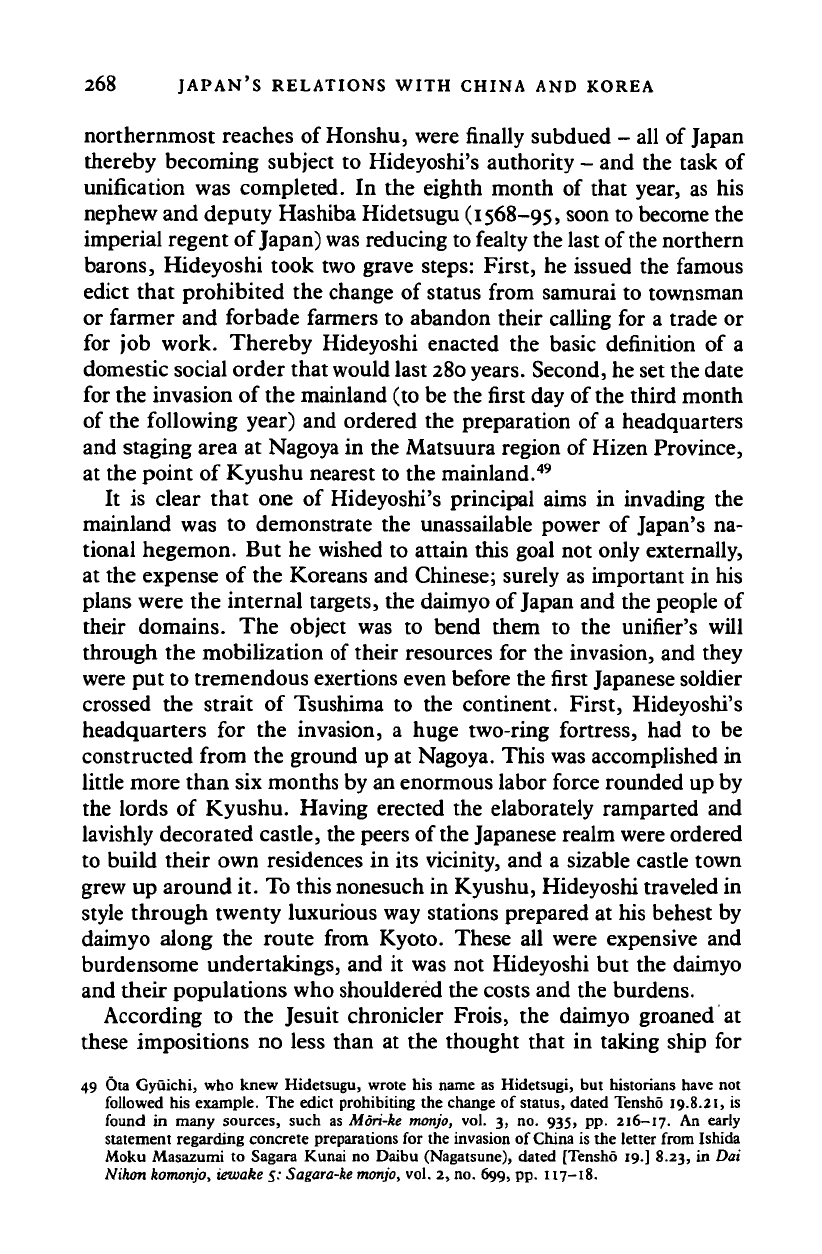
268 JAPAN'S RELATIONS WITH CHINA AND KOREA
northernmost reaches of Honshu, were finally subdued - all of Japan
thereby becoming subject to Hideyoshi's authority - and the task of
unification was completed. In the eighth month of that year, as his
nephew and deputy Hashiba Hidetsugu (1568-95, soon to become the
imperial regent of Japan) was reducing to fealty the last of
the
northern
barons, Hideyoshi took two grave steps: First, he issued the famous
edict that prohibited the change of status from samurai to townsman
or farmer and forbade farmers to abandon their calling for a trade or
for job work. Thereby Hideyoshi enacted the basic definition of a
domestic social order that would last 280
years.
Second, he set the date
for the invasion of the mainland (to be the first day of
the
third month
of the following year) and ordered the preparation of a headquarters
and staging area at Nagoya in the Matsuura region of Hizen Province,
at the point of Kyushu nearest to the mainland.
49
It is clear that one of Hideyoshi's principal aims in invading the
mainland was to demonstrate the unassailable power of Japan's na-
tional hegemon. But he wished to attain this goal not only externally,
at the expense of the Koreans and Chinese; surely as important in his
plans were the internal targets, the daimyo of Japan and the people of
their domains. The object was to bend them to the unifier's will
through the mobilization of their resources for the invasion, and they
were put to tremendous exertions even before the first Japanese soldier
crossed the strait of Tsushima to the continent. First, Hideyoshi's
headquarters for the invasion, a huge two-ring fortress, had to be
constructed from the ground up at Nagoya. This was accomplished in
little more than six months by an enormous labor force rounded up by
the lords of Kyushu. Having erected the elaborately ramparted and
lavishly decorated castle, the peers of the Japanese realm were ordered
to build their own residences in its vicinity, and a sizable castle town
grew up around it. To this nonesuch in Kyushu, Hideyoshi traveled in
style through twenty luxurious way stations prepared at his behest by
daimyo along the route from Kyoto. These all were expensive and
burdensome undertakings, and it was not Hideyoshi but the daimyo
and their populations who shouldered the costs and the burdens.
According to the Jesuit chronicler Frois, the daimyo groaned at
these impositions no less than at the thought that in taking ship for
49 Ota Gyuichi, who knew Hidetsugu, wrote his name as Hidetsugi, but historians have not
followed his example. The edict prohibiting the change of status, dated Tensho 19.8.21, is
found in many sources, such as Mori-ke monjo, vol. 3, no. 935, pp. 216-17. An early
statement regarding concrete preparations for the invasion of China is the letter from Ishida
Moku Masazumi to Sagara Kunai no Daibu (Nagatsune), dated [Tensho 19.] 8.23, in Dai
Nihon komonjo, iewake 5: Sagara-ke
monjo,
vol. 2, no. 699, pp. 117-18.
Cambridge Histories Online © Cambridge University Press, 2008
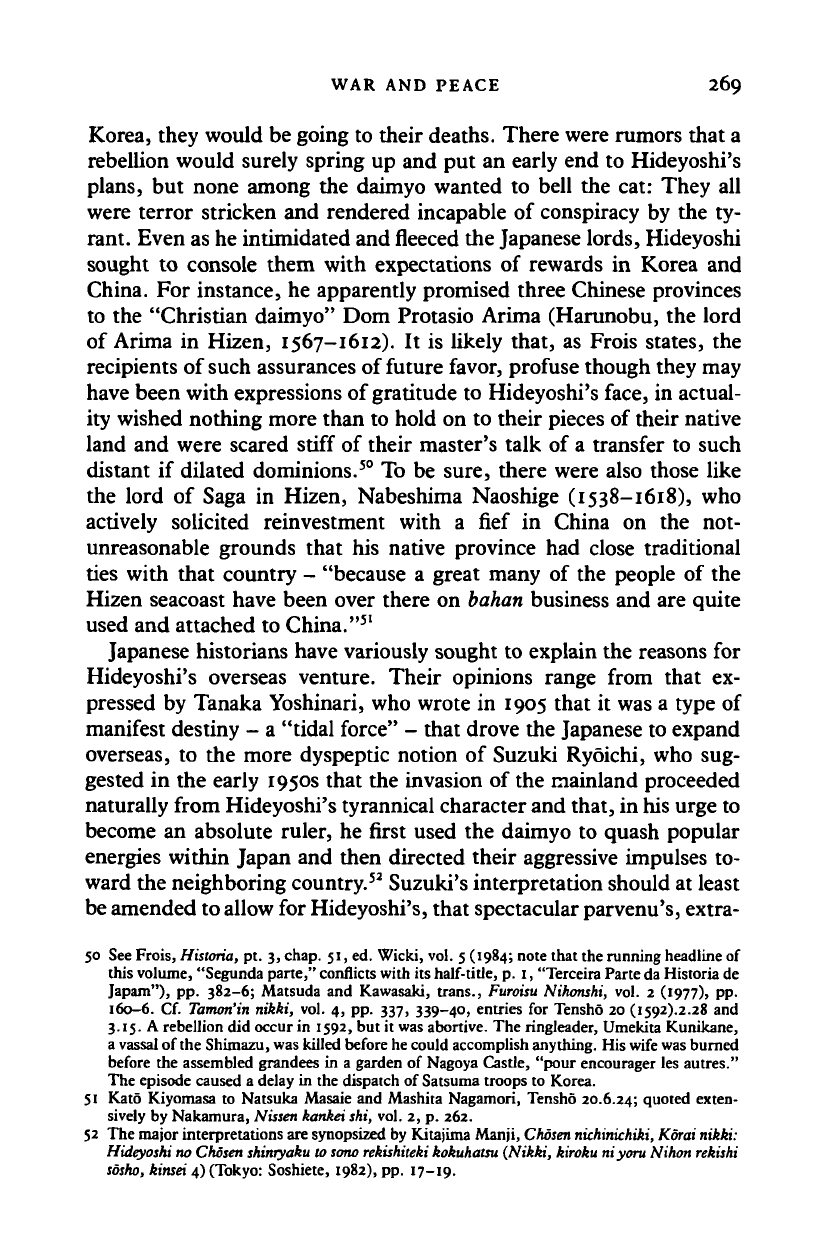
WAR AND PEACE 269
Korea, they would be going to their deaths. There were rumors that a
rebellion would surely spring up and put an early end to Hideyoshi's
plans,
but none among the daimyo wanted to bell the cat: They all
were terror stricken and rendered incapable of conspiracy by the ty-
rant. Even as he intimidated and
fleeced
the Japanese lords, Hideyoshi
sought to console them with expectations of rewards in Korea and
China. For instance, he apparently promised three Chinese provinces
to the "Christian daimyo" Dom Protasio Arima (Harunobu, the lord
of Arima in Hizen, 1567-1612). It is likely that, as Frois states, the
recipients of such assurances of future favor, profuse though they may
have been with expressions of gratitude to Hideyoshi's face, in actual-
ity wished nothing more than to hold on to their pieces of their native
land and were scared stiff of their master's talk of a transfer to such
distant if dilated dominions.
50
To be sure, there were also those like
the lord of Saga in Hizen, Nabeshima Naoshige (i538-1618), who
actively solicited reinvestment with a fief in China on the not-
unreasonable grounds that his native province had close traditional
ties with that country - "because a great many of the people of the
Hizen seacoast have been over there on
bahan
business and are quite
used and attached to China."
51
Japanese historians have variously sought to explain the reasons for
Hideyoshi's overseas venture. Their opinions range from that ex-
pressed by Tanaka Yoshinari, who wrote in 1905 that it was a type of
manifest destiny - a "tidal force" - that drove the Japanese to expand
overseas, to the more dyspeptic notion of Suzuki Ryoichi, who sug-
gested in the early 1950s that the invasion of the mainland proceeded
naturally from Hideyoshi's tyrannical character and that, in his urge to
become an absolute ruler, he first used the daimyo to quash popular
energies within Japan and then directed their aggressive impulses to-
ward the neighboring country.
52
Suzuki's interpretation should at least
be amended to allow for Hideyoshi's, that spectacular parvenu's, extra-
50 See Frois, Historia, pt. 3, chap. 51, ed. Wicki, vol. 5 (1984; note that the running headline of
this volume, "Segunda pane," conflicts with its half-title, p. 1, "Terceira Pane da Historia de
Japam"), pp. 382-6; Matsuda and Kawasaki, trans.,
Furoisu
Nihonshi, vol. 2 (1977), pp.
160-6. Cf. Tamon'in nikki, vol. 4, pp. 337, 339-40, entries for Tensho 20 (i592).2.28 and
3.15. A rebellion did occur in 1592, but it was abortive. The ringleader, Umekita Kunikane,
a vassal of the Shimazu, was killed before he could accomplish anything. His wife was burned
before the assembled grandees in a garden of Nagoya Castle, "pour encourager les autres."
The episode caused a delay in the dispatch of Satsuma troops to Korea.
51 Kato Kiyomasa to Natsuka Masaie and Mashita Nagamori, Tensho 20.6.24; quoted exten-
sively by Nakamura, Nissen kankei shi, vol. 2, p. 262.
52 The major interpretations are synopsized by Kitajima Manji,
Chosen
nichinichiki,
Korai nikki:
Hideyoshi no
Chosen
shintyaku to
sono rekishiteki kokuhatsu
(Nikki,
kiroku
niyoru Nihon
rekishi
sosho,
kinsei 4) (Tokyo: Soshiete, 1982), pp. 17-19.
Cambridge Histories Online © Cambridge University Press, 2008
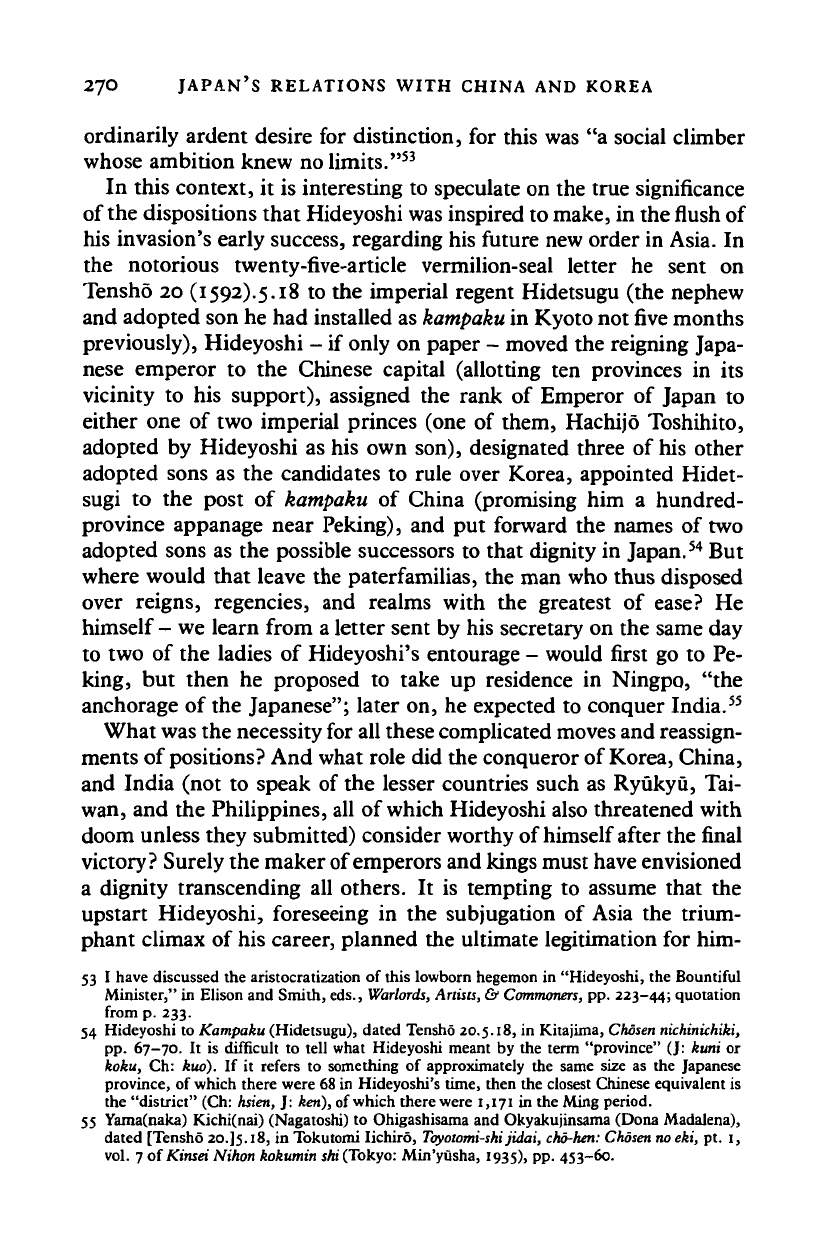
270 JAPAN'S RELATIONS WITH CHINA AND KOREA
ordinarily ardent desire for distinction, for this was "a social climber
whose ambition knew no limits."
53
In this context, it is interesting to speculate on the true significance
of the dispositions that Hideyoshi was inspired to make, in the flush of
his invasion's early success, regarding his future new order in Asia. In
the notorious twenty-five-article vermilion-seal letter he sent on
Tensho 20 (I592).5.i8 to the imperial regent Hidetsugu (the nephew
and adopted son he had installed as
kampaku
in Kyoto not five months
previously), Hideyoshi - if only on paper - moved the reigning Japa-
nese emperor to the Chinese capital (allotting ten provinces in its
vicinity to his support), assigned the rank of Emperor of Japan to
either one of two imperial princes (one of them, Hachijo Toshihito,
adopted by Hideyoshi as his own son), designated three of his other
adopted sons as the candidates to rule over Korea, appointed Hidet-
sugi to the post of kampaku of China (promising him a hundred-
province appanage near Peking), and put forward the names of two
adopted sons as the possible successors to that dignity in Japan.
54
But
where would that leave the paterfamilias, the man who thus disposed
over reigns, regencies, and realms with the greatest of ease? He
himself - we learn from a letter sent by his secretary on the same day
to two of the ladies of Hideyoshi's entourage - would first go to Pe-
king, but then he proposed to take up residence in Ningpo, "the
anchorage of the Japanese"; later on, he expected to conquer India.
55
What was the necessity for all these complicated moves and reassign-
ments of positions? And what role did the conqueror of Korea, China,
and India (not to speak of the lesser countries such as Ryukyu, Tai-
wan, and the Philippines, all of which Hideyoshi also threatened with
doom unless they submitted) consider worthy of himself after the final
victory? Surely the maker of emperors and kings must have envisioned
a dignity transcending all others. It is tempting to assume that the
upstart Hideyoshi, foreseeing in the subjugation of Asia the trium-
phant climax of his career, planned the ultimate legitimation for him-
53 I have discussed the aristocratization of this lowborn hegemon in "Hideyoshi, the Bountiful
Minister," in Elison and Smith, eds.,
Warlords,
Artists, &
Commoners,
pp. 223-44; quotation
from p. 233.
54 Hideyoshi to Kampaku (Hidetsugu), dated Tensho 20.5.18, in Kitajima, Chosen
nichinichiki,
pp.
67-70. It is difficult to tell what Hideyoshi meant by the term "province" (J: kuni or
koku, Ch: kuo). If it refers to something of approximately the same size as the Japanese
province, of which there were 68 in Hideyoshi's time, then the closest Chinese equivalent is
the "district" (Ch: hsien, J: ken), of which there were 1,171 in the Ming period.
55 Yama(naka) Kichi(nai) (Nagatoshi) to Ohigashisama and Okyakujinsama (Dona Madalena),
dated [Tensho 20.J5.18, in Tokutomi Iichiro, Toyowmi-shi jidai,
cho-hen:
Chosen no
eki, pt. 1,
vol. 7 oiKinsei Nihon kokumin
shi
(Tokyo: Min'yusha, 1935), pp. 453-60.
Cambridge Histories Online © Cambridge University Press, 2008
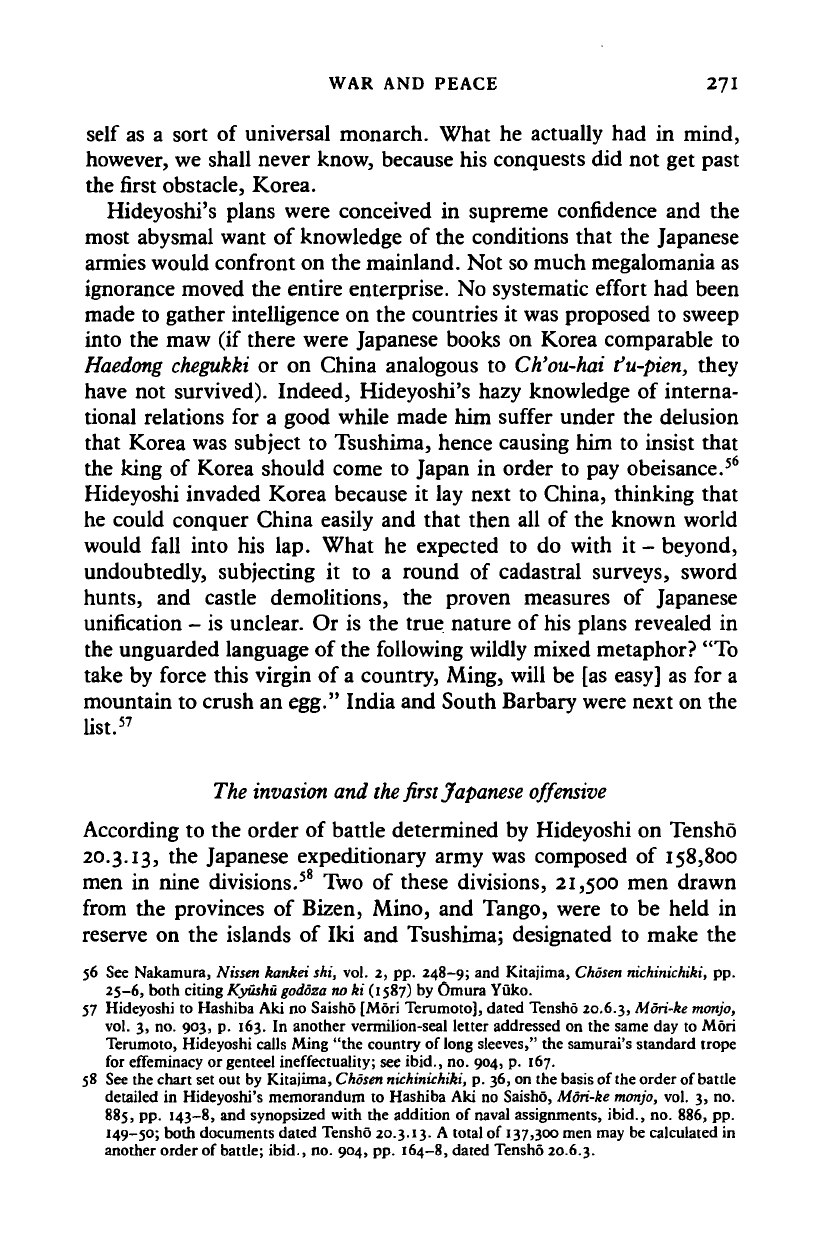
WAR AND PEACE 27I
self as a sort of universal monarch. What he actually had in mind,
however, we shall never know, because his conquests did not get past
the first obstacle, Korea.
Hideyoshi's plans were conceived in supreme confidence and the
most abysmal want of knowledge of the conditions that the Japanese
armies would confront on the mainland. Not so much megalomania as
ignorance moved the entire enterprise. No systematic effort had been
made to gather intelligence on the countries it was proposed to sweep
into the maw (if there were Japanese books on Korea comparable to
Haedong chegukki
or on China analogous to Ch'ou-hai fu-pien, they
have not survived). Indeed, Hideyoshi's hazy knowledge of interna-
tional relations for a good while made him suffer under the delusion
that Korea was subject to Tsushima, hence causing him to insist that
the king of Korea should come to Japan in order to pay obeisance.
56
Hideyoshi invaded Korea because it lay next to China, thinking that
he could conquer China easily and that then all of the known world
would fall into his lap. What he expected to do with it - beyond,
undoubtedly, subjecting it to a round of cadastral surveys, sword
hunts,
and castle demolitions, the proven measures of Japanese
unification - is unclear. Or is the true nature of his plans revealed in
the unguarded language of the following wildly mixed metaphor? "To
take by force this virgin of a country, Ming, will be [as easy] as for a
mountain to crush an egg." India and South Barbary were next on the
list.
57
The invasion and the
first
Japanese offensive
According to the order of battle determined by Hideyoshi on Tenshd
20.3.13,
the Japanese expeditionary army was composed of 158,800
men in nine divisions.
58
Two of these divisions, 21,500 men drawn
from the provinces of Bizen, Mino, and Tango, were to be held in
reserve on the islands of Iki and Tsushima; designated to make the
56 See Nakamura, Nissen kanhei shi, vol. 2, pp. 248-9; and Kitajima, Chosen
nichinichiki,
pp.
25-6,
both citing Kyushu godoza no ki (1587) by Omura Yuko.
57 Hideyoshi to Hashiba Aki no Saisho [Mori Terumoto], dated Tensho 20.6.3, Mori-ke monjo,
vol. 3, no. 903, p. 163. In another vermilion-seal letter addressed on the same day to Mori
Terumoto, Hideyoshi calls Ming "the country of long sleeves," the samurai's standard trope
for effeminacy or genteel ineffectuality; see ibid., no. 904, p. 167.
58 See the chart set out by Kitajima,
Chosen
nichinichiki,
p. 36, on the basis of the order of battle
detailed in Hideyoshi's memorandum to Hashiba Aki no Saisho, Mori-ke
monjo,
vol. 3, no.
885,
pp. 143-8, and synopsized with the addition of naval assignments, ibid., no. 886, pp.
149-50; both documents dated Tensho 20.3.13. A total of 137,300 men may be calculated in
another order of
battle;
ibid., no. 904, pp. 164-8, dated Tenshd 20.6.3.
Cambridge Histories Online © Cambridge University Press, 2008
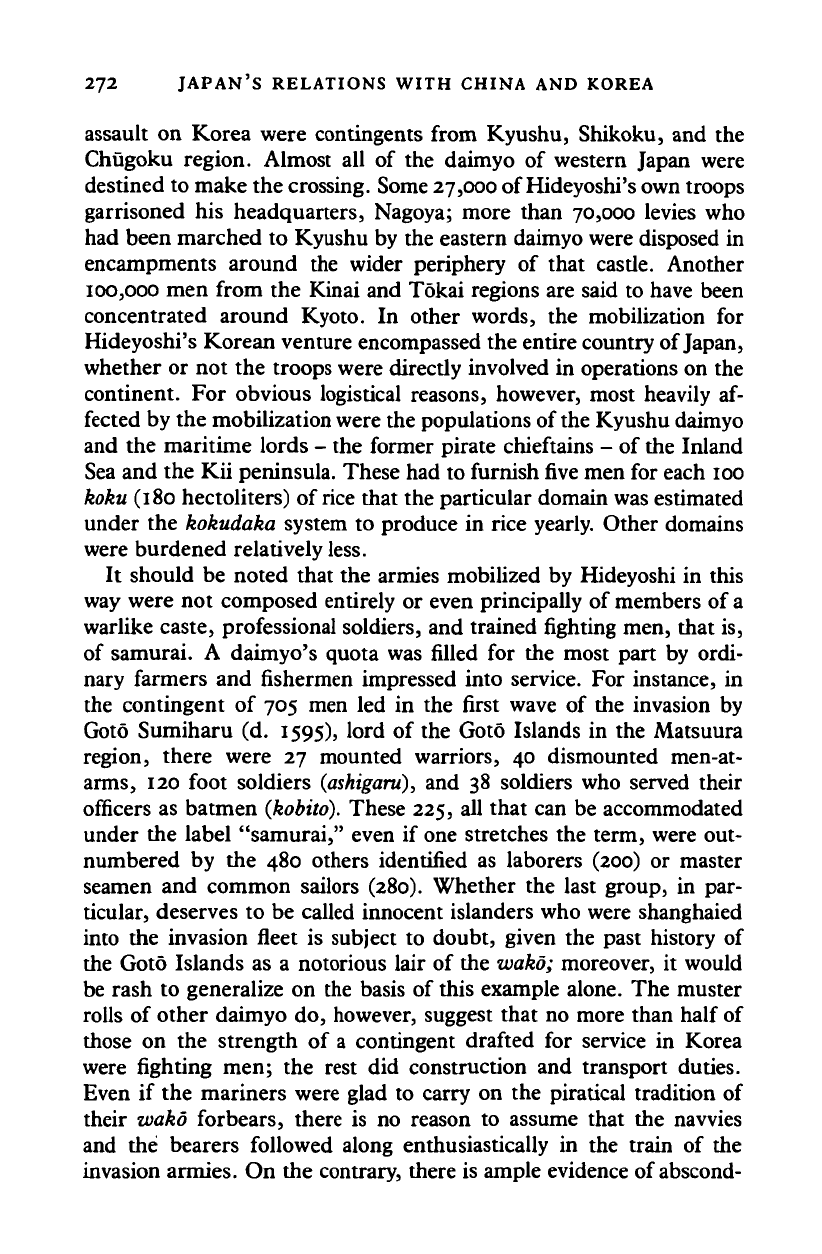
272 JAPAN'S RELATIONS WITH CHINA AND KOREA
assault on Korea were contingents from Kyushu, Shikoku, and the
Chugoku region. Almost all of the daimyo of western Japan were
destined to make the crossing. Some 27,000 of Hideyoshi's own troops
garrisoned his headquarters, Nagoya; more than 70,000 levies who
had been marched to Kyushu by the eastern daimyo were disposed in
encampments around the wider periphery of that castle. Another
100,000 men from the Kinai and Tokai regions are said to have been
concentrated around Kyoto. In other words, the mobilization for
Hideyoshi's Korean venture encompassed the entire country of Japan,
whether or not the troops were directly involved in operations on the
continent. For obvious logistical reasons, however, most heavily af-
fected by the mobilization were the populations of the Kyushu daimyo
and the maritime lords - the former pirate chieftains - of the Inland
Sea and the Kii peninsula. These had to furnish five men for each 100
koku (180 hectoliters) of
rice
that the particular domain was estimated
under the kokudaka system to produce in rice yearly. Other domains
were burdened relatively less.
It should be noted that the armies mobilized by Hideyoshi in this
way were not composed entirely or even principally of members of a
warlike caste, professional soldiers, and trained fighting men, that is,
of samurai. A daimyo's quota was filled for the most part by ordi-
nary farmers and fishermen impressed into service. For instance, in
the contingent of 705 men led in the first wave of the invasion by
Goto Sumiharu (d. 1595), lord of the Goto Islands in the Matsuura
region, there were 27 mounted warriors, 40 dismounted men-at-
arms,
120 foot soldiers
(ashigaru),
and 38 soldiers who served their
officers as batmen
(kobito).
These 225, all that can be accommodated
under the label "samurai," even if one stretches the term, were out-
numbered by the 480 others identified as laborers (200) or master
seamen and common sailors (280). Whether the last group, in par-
ticular, deserves to be called innocent islanders who were shanghaied
into the invasion fleet is subject to doubt, given the past history of
the Goto Islands as a notorious lair of the wako; moreover, it would
be rash to generalize on the basis of this example alone. The muster
rolls of other daimyo do, however, suggest that no more than half of
those on the strength of a contingent drafted for service in Korea
were fighting men; the rest did construction and transport duties.
Even if the mariners were glad to carry on the piratical tradition of
their wako forbears, there is no reason to assume that the navvies
and the bearers followed along enthusiastically in the train of the
invasion armies. On the contrary, there is ample evidence of abscond-
Cambridge Histories Online © Cambridge University Press, 2008
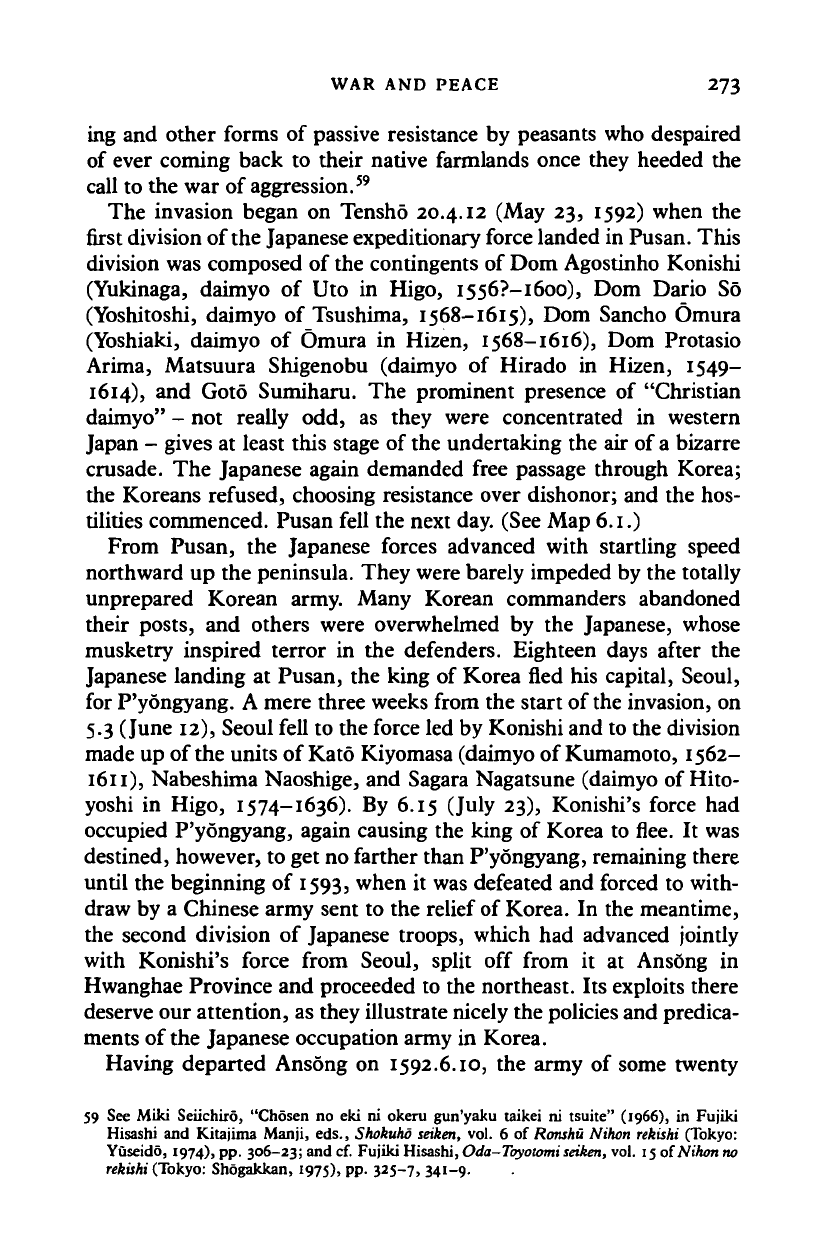
WAR AND
PEACE
273
ing and other forms of passive resistance by peasants who despaired
of ever coming back to their native farmlands once they heeded the
call to the war of aggression.
59
The invasion began on Tensho 20.4.12 (May 23, 1592) when the
first division of the Japanese expeditionary force landed in Pusan. This
division was composed of the contingents of Dom Agostinho Konishi
(Yukinaga, daimyo of Uto in Higo, I556?-I6OO), Dom Dario So
(Yoshitoshi, daimyo of Tsushima, 1568-1615), Dom Sancho Omura
(Yoshiaki, daimyo of Omura in Hizen, 1568-1616), Dom Protasio
Arima, Matsuura Shigenobu (daimyo of Hirado in Hizen, 1549-
1614),
and Goto Sumiharu. The prominent presence of "Christian
daimyo" - not really odd, as they were concentrated in western
Japan - gives at least this stage of the undertaking the air of
a
bizarre
crusade. The Japanese again demanded free passage through Korea;
the Koreans refused, choosing resistance over dishonor; and the hos-
tilities commenced. Pusan fell the next day. (See Map 6.1.)
From Pusan, the Japanese forces advanced with startling speed
northward up the peninsula. They were barely impeded by the totally
unprepared Korean army. Many Korean commanders abandoned
their posts, and others were overwhelmed by the Japanese, whose
musketry inspired terror in the defenders. Eighteen days after the
Japanese landing at Pusan, the king of Korea fled his capital, Seoul,
for P'yongyang. A mere three weeks from the start of
the
invasion, on
5.3 (June 12), Seoul fell to the force led by Konishi and to the division
made up of the units of Kato Kiyomasa (daimyo of Kumamoto, 1562-
1611),
Nabeshima Naoshige, and Sagara Nagatsune (daimyo of Hito-
yoshi in Higo, 1574-1636). By 6.15 (July 23), Konishi's force had
occupied P'yongyang, again causing the king of Korea to flee. It was
destined, however, to get no farther than P'yongyang, remaining there
until the beginning of
1593,
when it was defeated and forced to with-
draw by a Chinese army sent to the relief of Korea. In the meantime,
the second division of Japanese troops, which had advanced jointly
with Konishi's force from Seoul, split off from it at Ansong in
Hwanghae Province and proceeded to the northeast. Its exploits there
deserve our attention, as they illustrate nicely the policies and predica-
ments of the Japanese occupation army in Korea.
Having departed Ansong on 1592.6.10, the army of some twenty
59 See Miki Seiichird, "Chosen no eki ni okeru gun'yaku taikei ni tsuite" (1966), in Fujiki
Hisashi and Kitajima Manji, eds., Shokuho seiken, vol. 6 of Ronshu Nihon rekishi (Tokyo:
Yuseido, 1974), pp. 306-23; and cf. Fujiki Hisashi, Oda-Toyotomi
seiken,
vol. 15 of Nihon no
rekishi
(Tokyo: Shogakkan, 1975), pp. 325-7, 341-9.
Cambridge Histories Online © Cambridge University Press, 2008
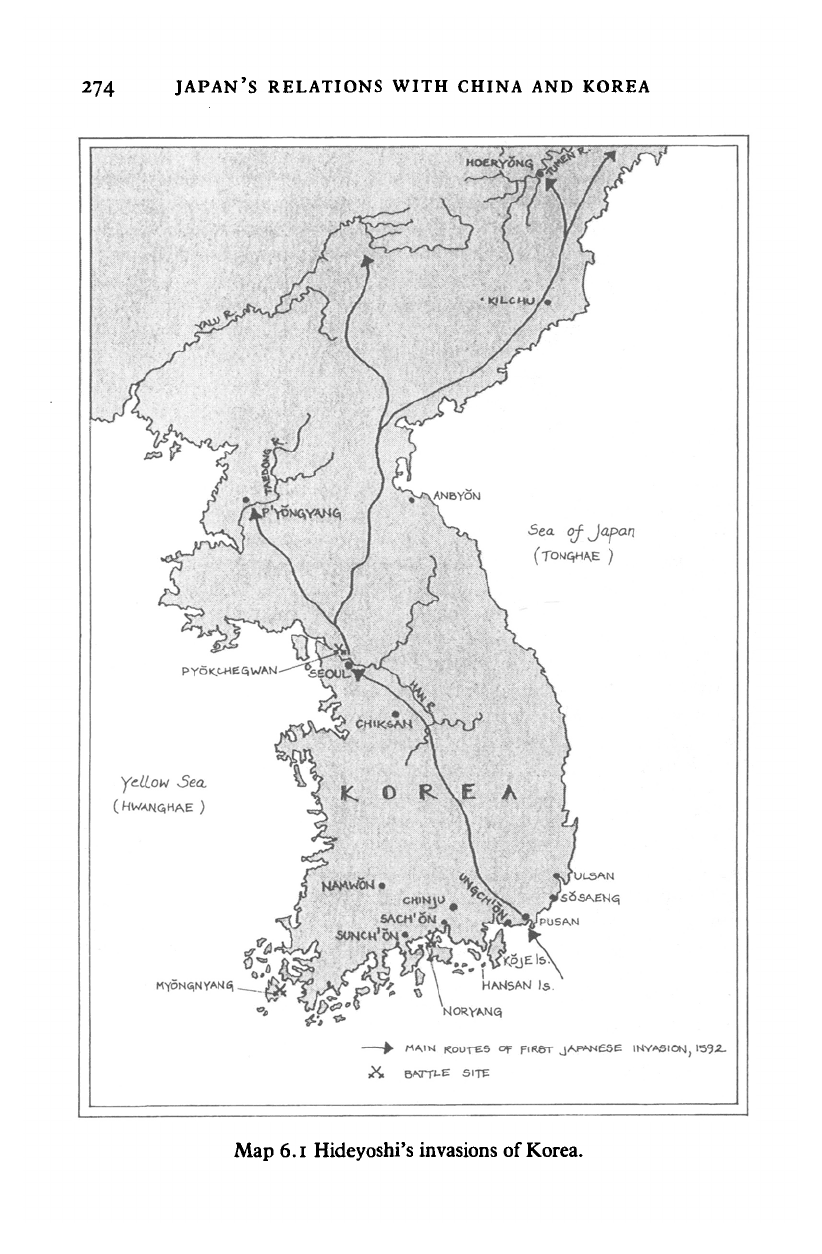
274 JAPAN'S RELATIONS WITH CHINA AND KOREA
MMM RourE5 OF FIRST
SITE
j I5g.2_
Map 6.1 Hideyoshi's invasions of Korea.
Cambridge Histories Online © Cambridge University Press, 2008
